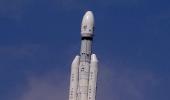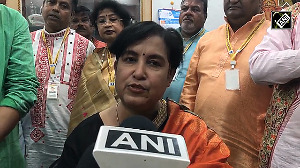It was a double delight for scientists at Indian Space Research Organisastion on Sunday as the space agency scripted a successful mission and also reaped victory in a unique scientific experiment using the fourth stage of a Polar Satellite Launch Vehicle rocket.

In a dedicated commercial mission earlier in the day, ISRO successfully placed seven Singaporean satellites into intended orbits on board a PSLV.
During the mission, the scientists decided to perform a unique scientific experiment in which the fourth stage of the rocket would be lowered into a 300 kilometre orbit after placing customer satellites at an altitude of 536 km "to mitigate the space debris problem", according to chairman S Somanath.
In an update after the successful launch of PSLV-C56 mission, ISRO said the unique attempt by the scientists is "successful" and "ISRO/India remains committed to reduced space debris".
According to ISRO, normally after a successful mission, a rocket before re-entering into the Earth's atmosphere would travel for "decades" in an orbit as a space debris. However, with Sunday's experiment, the duration is now reduced to "two months".
"PSLV-C56/DS-SAR Mission: The PS4 stage de-orbiting experiment is successful. The stage is purposefully manoeuvred to a 295 kms x 300 km orbit," ISRO said in a social media post.
The fourth stage of the rocket now spends significantly less time in space, reducing its duration from over decades to less than two months, before re-entering the Earth's atmosphere, ISRO said.
"Reduced time in Space = Less risk of debris. India remains committed to reduced space debris and sustainable use of space for the benefit of all," the space agency added in the social media post.
Earlier, addressing scientists from the Mission Control Centre, Somanath said: "We are going to have many exciting further activities on the PS4 stage after this (successful launch). The PSLV fourth stage, which is currently in the orbit of the satellite which is at almost 535 km circular orbit in a 5-degree inclination, will be brought back to a lower orbit of 300 km."
He said the reason for bringing back the PS4 stage to a lower orbit was "to mitigate space debris problems".
"The experiment is being done with an intent to have a lower lifespan of the stage being spent in space, primarily to make sure that the space debris mitigation problems are addressed through our conscious efforts to bring back the PSLV upper stage in a controlled manner, and to demonstrate that in this mission," Somanath, who is also secretary, department of space, said.
Echoing the chairman's view, PSLV mission director SR Biju said, "As our chairman indicated, we have not completed the mission. The primary objective of the mission is completed (to place the seven Singapore satellites into intended orbits) and it has become a habit for PSLV (sic) to do some experiments (in the fourth stage of the rocket)."
"We are embarking on it after the completion of the primary mission because we are taking the PS4 stage back to another orbit, because this orbit of 536 km-570km is very much in demand for many satellites. So, we thought we will not be wandering there and we decided that we will take the PS4 stage or the spent stage to another orbit, to another objective for two purposes," he said.
"One, our chairman has told us to do whatever is best possible to mitigate the menace of debris in orbit and another thing, this precious orbit will not be occupied with spent PS4 stage as debris and we will give space for future satellites. These are two objectives with which we are doing this experiment, and that experiment is in progress," he said.
In April, ISRO undertook a similar exercise during the launch of the PSLV-C55 mission where the fourth stage of a PSLV rocket was utilised as an orbital platform to carry out scientific experiments using the PSLV Orbital Experimental Module (POEM) in the rocket.











 © 2025
© 2025